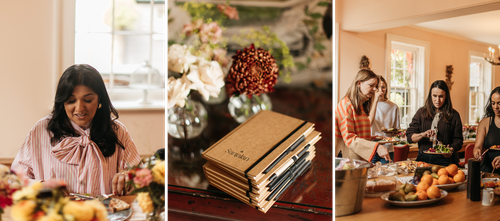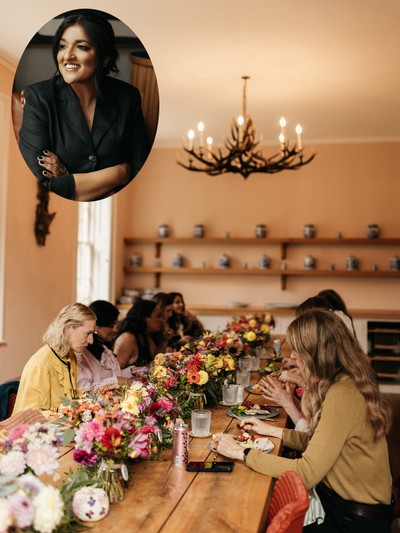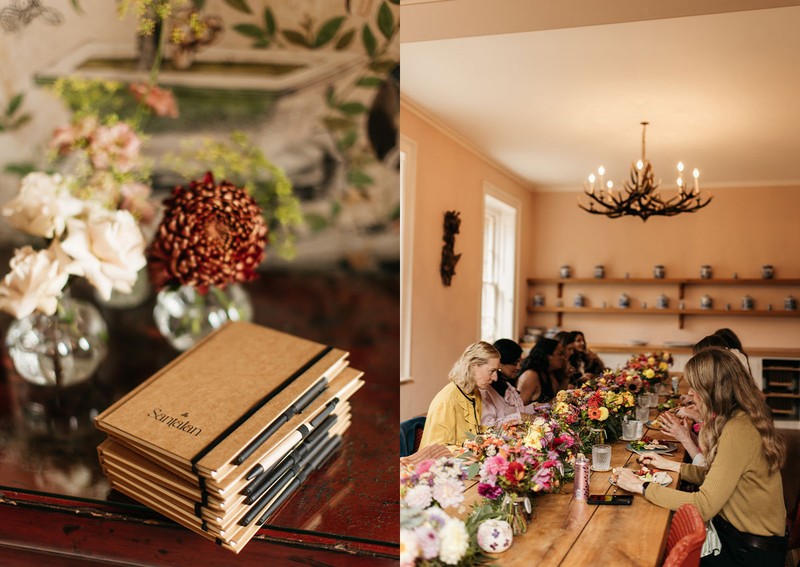

9 Careers Tips From A Business Coach
All products on this page have been selected by our editorial team, however we may make commission on some products.
Know when to leave the party.
My fashion journey began unexpectedly after a university retail internship showed me that unlike law (which I was studying) fashion buying would let me own the creative process. Starting at House of Fraser as a buyer’s assistant, I worked my way up to senior buyer. After progressing through several companies including Etam, Freya Lingerie and Freemans Mail Order, I joined BHS under Philip Green. Within four years, I had the notion of testing my skills on an international stage, so I decided to relocate to India to establish Boudoir London. Within a few years, it had become India's premier lingerie brand. However, adapting to India presented considerable challenges: I did not speak the local language, encountered prevalent corruption, had people demanding protection money on the first day of my business launch, and experienced a terrorist attack. As my father says, you should always know when to leave the party. After five years, I decided it was time to close this chapter, sell the business and return home.
Find your strengths & use them to your advantage.
Not long after returning to the UK, I was offered a role in Berlin as vice-president of womenswear at Zalando. This presented a similar challenge to India, involving a new country and category, and now within an online-only business model. The primary challenges were related to managing people rather than products. I recognised that my strength lay in problem-solving and implementing solutions. I could quickly identify core issues, devise resolutions and establish processes for their execution. By the time I left, I had become adept at working with individuals from diverse backgrounds and perspectives, leading a team of 600 people from 40 countries.
Don’t be afraid of change.
I left Berlin after five years, during which time I’d become H&M's chief commercial officer. In 2019, back in London, I realised my relationship with fashion had evolved. Although I still loved the industry, I understood it was time to approach things differently. I believed customers wanted a change from non-stop fashion consumption – they weren’t inclined to spend more money on fashion nor dedicate their lives to finding sustainable clothes. I believed that they wanted to make intentional purchases of aspirational, affordable items produced with transparency. So, in February 2020, I launched Aligne. A month later, we went into lockdown, and despite facing scepticism about launching during such challenging times, I remained steadfast. I always said the moment will come when women will want this product and, when it does, I want to be there with a collection that works for them.
Pivot in line with your passion.
A significant issue I frequently encountered throughout my career was a lack of support and adequate resources available to women. My eventual decision to transition into coaching was further prompted by the noticeable trend of women leaving the fashion industry in their 40s and 50s. Recent data shows more women left the workplace last year than in the previous two years combined. Women don't feel they can discuss their unique challenges, such as managing family responsibilities alongside professional duties. I saw that becoming a certified coach would enable me to mitigate this talent drain by offering support to individuals both within and beyond the fashion industry. Today, my focus is on transformational rather than therapeutic approaches, which aligns with my lifelong passion for actualising customer needs. I have identified clear parallels between recognising fashion trends and finding ways to deliver them in a timely manner, and assisting women in discovering and realising their emerging potential.
Recognise that balance isn't a destination.
Women often face significant challenges in achieving a balanced life. They are frequently required to do the ‘double shift’, managing both professional responsibilities and domestic duties concurrently. It means balance is an ongoing practice that requires constant attention. Sometimes life will be challenging, but you can create counterbalances. When facing extreme moments, look at balance from a month-to-month perspective rather than expecting perfection daily. Life is incredibly difficult for women trying to build careers while creating fulfilling personal lives. Throughout my career, I've watched talented people burn out and give up entirely. Santalan's mission is to help them optimise future opportunities with support. My entire life, I struggled with balance, treating it like a place I could eventually reach. Every time I left a job, I told myself the next position would give me better work-life balance, but it never did, because mentally I wasn't approaching life in a way that would create balance. I've come to understand that balance isn't a destination – it's a daily practice and lifelong effort.
View life holistically.
One of my biggest mistakes was believing career success would make everything else work. You can run a £5 billion company but if you're burning out, it's not sustainable. Success isn't getting a promotion if you haven't seen friends for weeks, nor is it having endless fun if you're not earning enough. External business coaching provides a safe space for honesty. Leaders can admit their struggles without fear of judgment. At Santalan, our coaches bring legitimate business experience – in my case, 30 years of fashion commercial experience across organisations from start-ups to multibillion-dollar corporations. This combination of safety and expertise allows leaders to address skill gaps and develop capabilities that might otherwise remain undeveloped, resulting in more effective, confident leadership – and a more well-rounded life, both professionally and personally.
Question your definition of success.
Ask yourself – are you pursuing success that genuinely makes you happy or following other people’s expectations? By defining what success means to you, you might discover it looks different from what you're currently pursuing. At Santalan, our focus is on taking actions and seeing results that are defined by each participant rather than by external standards. Women have historically measured themselves against benchmarks that may not align with their authentic desires. Our aim is to assist each woman in clarifying her own definition of success and constructing a roadmap based on her personal criteria. You also need to celebrate everything you achieve, even if it’s imperfect. Giving yourself credit creates motivation to continue building sustainable success and balance.
Prioritise the four pillars.
The four pillars of the Santalan programme are deliberately interconnected. Health and wellbeing form the foundation – because without physical and mental energy, nothing else is sustainable. Personal brand then connects internal identity with external perception. This is a pillar ambitious women can no longer overlook in today's digital world, where your reputation precedes you and how you present yourself significantly impacts opportunities. Business and career development focuses on strategic advancement while maintaining alignment with personal values. Relationships encompass both professional and personal connections, so they’re essential for sustained success and fulfilment. Santalan isn't about fixing something that’s broken – it's about elevating what's already working and transforming good into extraordinary.
Find the right support.
Women deserve to love their work, lives, and themselves but workplaces often fail to provide necessary support. Business coaching offers women a space to address these unique challenges while maintaining both career trajectories and personal wellbeing. Recently, I worked with a woman in her late 40s struggling in a new organisation where everyone was younger. She was ready to give up, feeling she no longer belonged. Through coaching, we helped her recognise that her 25 years of experience represented ‘golden skills’ that younger colleagues needed. We created opportunities for knowledge exchange, positioning her as a valuable resource while colleagues helped update her skills, benefiting everyone involved. The UK currently lags in coaching adoption for two key reasons: organisations view it as remedial rather than preventative, while individuals associate it with counselling, focused on past failures rather than performance enhancement. I've always gravitated toward addressing emerging needs and women's specialised coaching represents one of the most significant upcoming workplace trends – where professional development intersects with wellbeing.
Visit SANTALAN.COM & follow @DALBAINS1
DISCLAIMER: We endeavour to always credit the correct original source of every image we use. If you think a credit may be incorrect, please contact us at info@sheerluxe.com.


/https%3A%2F%2Fsheerluxe.com%2Fsites%2Fsheerluxe%2Ffiles%2Farticles%2F2025%2F03%2Fsl-business-edition-coaching-leaders-fb.jpg?itok=m1HtC7xY)

